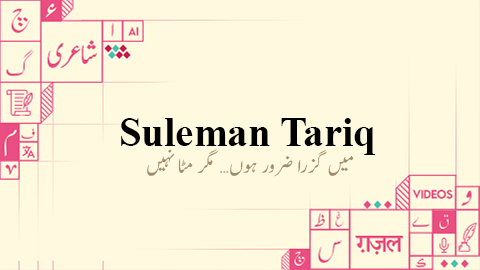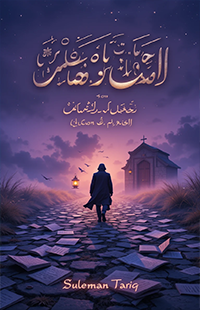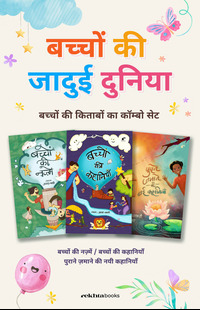





تمہارے بغیر دن اداس گزرتے ہیں
تمہاری یاد میں راتیں روشن ہو جاتی ہیں
TODAY’S TOP URDU SHAYARI #01
Suleman Tariq
💬 WhatsApp
📖 Read More from Book
URDU POETRY COLLECTION
TOP SAD
Suleman Tariq
TOP LOVE
ISHQ-e-haqiqi
TOP NEW
Top classic
TOP SAD
Suleman Tariq
TOP LOVE
ISHQ-e-haqiqi
TOP NEW
Top classic
Compilation of top 20 hand-picked Urdu shayari on the most sought-after subjects and poets
Suleman Tariq
Suleman Tariq
Suleman Tariq
Suleman Tariq
Suleman Tariq
Get latest Urdu books & Hindi books online only on Suleman Tariq Store
Urdu Poetry of the Day
تمہاری یاد کی بارش میں نہا لیتا ہوں
تمہاری یاد کی بارش میں نہا لیتا ہوں
ہر قطرے میں تمہارا عکس دیکھتا ہوں
…

Suleman Tariq
Author
تمہاری محبت کی کتاب لکھتا ہوں
تمہاری محبت کی کتاب لکھتا ہوں
ہر صفحے پر تمہارا نام دہراتا ہوں
…

Suleman Tariq
Author
تمہاری آنکھوں میں سمندر کی گہرائی
تمہاری آنکھوں میں سمندر کی گہرائی
ڈوب جانے کو جی چاہتا ہے بار بار
…

Suleman Tariq
Author
تمہاری یاد کے دیے جلائے ہیں
تمہاری یاد کے دیے جلائے ہیں
رات بھر تمہارا نام جپتا ہوں
…

Suleman Tariq
Author
Popular Poetry

Download This Image

Download This Image

Download This Image

Download This Image

Download This Image

Download This Image
Load More Images

تمہاری یاد کے دیے جلائے ہیں
رات بھر تمہارا نام جپتا ہوں
TODAY’S TOP URDU SHAYARI #01
Suleman Tariq
💬 WhatsApp
📖 Read More from Book
Dictionary Find Meaning
تمہاری محبت کی دھوپ میں کھڑا ہوں
سائے تلے بھی تمہاری یاد آتی ہے
TODAY’S TOP URDU SHAYARI #01
Suleman Tariq
💬 WhatsApp
📖 Read More from Book
You Also Watch Video
https://www.youtube.com/watch?v=XHOmBV4js_Ehttps://www.youtube.com/watch?v=XHOmBV4js_Ehttps://www.youtube.com/watch?v=XHOmBV4js_Ehttps://www.youtube.com/watch?v=XHOmBV4js_Ehttps://www.youtube.com/watch?v=XHOmBV4js_E
Watch More Videos
Suleman Tariq — In His Own Words
DID YOU KNOW?The word “Shabnam” means “dew” in Urdu, and it’s a combination of two Persian roots — “Shab” (night) and “Nam” (moisture).
So, “Shabnam” literally means “the moisture of the night.” In Urdu poetry, it’s more than a natural phenomenon — it symbolizes quiet sorrow, fragility, and emotional stillness, often compared to tears that fall in silence.DID YOU KNOW?The Urdu word “Hijr” (separation) is derived from the Arabic root “hajara,” meaning ‘to part’.
In poetry, “Hijr” is not just physical distance — it reflects deep emotional emptiness. Ghazals often revolve around this pain. Its poetic counterpart is “Visal” (union), a moment of spiritual or romantic completeness that lovers yearn for.DID YOU KNOW?The term “Mehfil” comes from Arabic and means a refined gathering, often for poetry or music.
In Urdu tradition, a Mehfil is more than an event — it’s a cultural ritual. From Mughal courts to modern Mushairas (poetry nights), Mehfils have preserved centuries of expression, art, and literary depthDID YOU KNOW?“Zehar Khanda” is a Persian-Urdu phrase that means ‘poisoned smile’.
It refers to a smile that hides pain, sarcasm, or quiet strength — and is widely used in classical Urdu poetry. Such a smile often symbolizes grace in adversity, a dignified resistance to emotional wounds.
DID YOU KNOW?“Khaamoshi” in Urdu doesn’t just mean silence — it’s often louder than speech in poetry.
Used by poets like Faiz and Ghalib, Khaamoshi can represent resistance, resilience, inner storms, or untold love. It shows how even stillness in Urdu literature is deeply expressive and layered with meaning.











